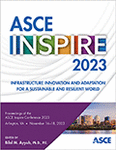A Digital Twin Framework to Simulate Urban Microclimates
Publication: ASCE Inspire 2023
ABSTRACT
Global cities are expected to face more severe climate crises in the future; therefore, it becomes increasingly acute to better understand urban microclimates, especially the urban thermal environments. This paper proposes an innovative urban microclimate digital twin framework for integrating multi-sourced spatiotemporal data, investigating effective modeling approaches, and exploring the mitigation potential of health risks and environmental harms resulting from extreme microclimate conditions. We examined our framework in the case of Phoenix to simulate its fine-scale thermal conditions. Our evaluation of multiple models shows that the GNN model outperforms other regression models by 36.3% and suggests that planting trees could be an effective strategy for heatwave mitigation. We also tested different urban greening strategies for their overall cooling efficiency, indicating that our framework can be used to assess fine-scale urban policy interventions and thus generate insights to inform the design and implementation of efficient mitigation plans.
Get full access to this article
View all available purchase options and get full access to this chapter.
REFERENCES
Aboubakri, O., Khanjani, N., Jahani, Y., and Bakhtiari, B. (2019). Attributable risk of mortality associated with heat and heat waves: A time-series study in Kerman, Iran during 2005–2017. Journal of Thermal Biology, 82, 76–82. https://doi.org/10.1016/j.jtherbio.2019.03.013.
Balázs, B., Unger, J., Gál, T., Sümeghy, Z., Geiger, J., and Szegedi, S. (2009). Simulation of the mean urban heat island using 2D surface parameters: Empirical modelling, verification and extension. Meteorological Applications, 16(3), 275–287. https://doi.org/10.1002/met.116.
Bokaie, M., Zarkesh, M. K., Arasteh, P. D., and Hosseini, A. (2016). Assessment of Urban Heat Island based on the relationship between land surface temperature and Land Use/ Land Cover in Tehran. Sustainable Cities and Society, 23, 94–104. https://doi.org/10.1016/j.scs.2016.03.009.
Campbell, S., Remenyi, T. A., White, C. J., and Johnston, F. H. (2018). Heatwave and health impact research: A global review. Health & Place, 53, 210–218. https://doi.org/10.1016/j.healthplace.2018.08.017.
Fan, C., Xu, J., Natarajan, B. Y., and Mostafavi, A. (2023). Interpretable machine learning learns complex interactions of urban features to understand socio‐economic inequality. Computer-Aided Civil and Infrastructure Engineering, mice.12972. https://doi.org/10.1111/mice.12972.
Guo, A., Yang, J., Sun, W., Xiao, X., Xia Cecilia, J., Jin, C., and Li, X. (2020). Impact of urban morphology and landscape characteristics on spatiotemporal heterogeneity of land surface temperature. Sustainable Cities and Society, 63, 102443. https://doi.org/10.1016/j.scs.2020.102443.
Heaviside, C., Macintyre, H., and Vardoulakis, S. (2017). The Urban Heat Island: Implications for Health in a Changing Environment. Current Environmental Health Reports, 4(3), 296–305. https://doi.org/10.1007/s40572-017-0150-3.
Heo, S., Bell, M. L., and Lee, J.-T. (2019). Comparison of health risks by heat wave definition: Applicability of wet-bulb globe temperature for heat wave criteria. Environmental Research, 168, 158–170. https://doi.org/10.1016/j.envres.2018.09.032.
San, O. (2021). The digital twin revolution. Nature Computational Science, 1(5), 307–308. https://doi.org/10.1038/s43588-021-00077-0.
White, R. H., et al. (2023). The unprecedented Pacific Northwest heatwave of June 2021. Nature Communications, 14(1), 727. https://doi.org/10.1038/s41467-023-36289-3.
Wu, Y., Zhao, K., Huang, J., Arend, M., Gross, B., and Moshary, F. (2019). Observation of heat wave effects on the urban air quality and PBL in New York City area. Atmospheric Environment, 218, 117024. https://doi.org/10.1016/j.atmosenv.2019.117024.
Zhou, X., Carmeliet, J., Sulzer, M., and Derome, D. (2020). Energy-efficient mitigation measures for improving indoor thermal comfort during heat waves. Applied Energy, 278, 115620. https://doi.org/10.1016/j.apenergy.2020.115620.
Information & Authors
Information
Published In
History
Published online: Nov 14, 2023
ASCE Technical Topics:
Authors
Metrics & Citations
Metrics
Citations
Download citation
If you have the appropriate software installed, you can download article citation data to the citation manager of your choice. Simply select your manager software from the list below and click Download.
